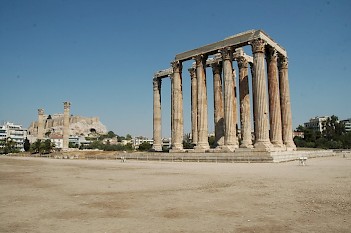Hippias - Livius (original) (raw)
Hippias (Greek: Ἱππίας): tyrant of Athens (r.528/527-510 BCE).
The temple of Zeus (finished in the Roman age); in the distance the Acropolis.
Hippias was the eldest son of Pisistratus, the first tyrant of Athens, whom he succeeded in 528/527. The Pisistratid tyranny was generally considered to have been quite moderatenote[Thucydides, History of the Peloponnesian War 6.54-55; ps.-Aristotle, Constitution of Athens 18.1.] and Hippias even appears to have recalled - or reconciled himself with - the exiled family of the Alcmeonids. One of then, Cleisthenes, was archon in 525/524.
Like all tyrants, Hippias tried to present his power and unite the city by means of large building projects. The west side of the agora was remodelled and a beginning was made with the temple of Zeus Olympius (which would not be completed until the Roman period). Unlike his father, Hippias was interested in the Acropolis: the temple of Athena Polias (the predecessor of the Parthenon) was renovated,propylaea were added, and to the south, a temple was dedicated to Dionysus Eleuthereus. Other building projects are known from Eleusis, Piraeus, and Thorikos.
In 514, Harmodius and Aristogeiton (the “tyrannicides”) assassinated Hippias' brother Hipparchus.note[Herodotus, Histories 5.55; Aristotle, Athenian Constitution 19.1.] Hippias' response was merciless: many people were sent into exile or killed.note[Herodotus, Histories 5.62; Thucydides, History of the Peloponnesian War 6.59; ps.-Aristotle, Constitution of Athens 19.] Cleisthenes, exiled again,note[Herodotus, Histories 5.62.] bribed the Pythian priestess of Delphi to tell the Spartans that they ought to help the Athenians liberate themselves.note[Herodotus, Histories 5.63, 5.66, 6.123; ps.Aristotle, Athenian Constitution 19.2.]
The Spartans obeyed. After a failed first operation,note[Herodotus, Histories 5.63; Aristotle, Athenian Constitution 19.5.] the Spartan king Cleomenes I besieged Hippias on the Acropolis, expelled the tyrant, and handed over power to the Athenian magistrates (511/510 BCE).note[Herodotus, Histories 5.64-65; Aristotle, Athenian Constitution 19.5-6.] This was the beginning of the Athenian democracy.
The Thessalians offered him the city of Iolkos and the Macedonians offered him Anthemus,note[Herodotus, Histories 5.94.] but Hippias settled in Sigeum at the entrance of the Hellespont. Trying to find support, he visited Sparta,note[Herodotus, Histories 5.91.] and eventually went to Sardes and Susa, where he asked help from the king of Persia, Darius I the Great.note[Herodotus, Histories 5.96, 6.94; Thucydides, History of the Peloponnesian War 6.59; ps.Aristotle, Athenian Constitution 19.] Indeed, the Persians tried to bring him back, but their expeditionary force was defeated at Marathon (490 BCE).note[Herodotus,Histories 6.102, 107-108.] Hippias must have died soon after.
